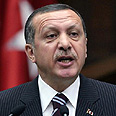
Obama: Turkey an important player in Iran issue
US President meets with Turkish Prime Minister Erdogan, who says his country stands ready to do whatever it can to achieve diplomatic solution on Iranian nuclear issue
WASHINGTON – US President Barack Obama said on Monday he believed Turkey could be an "important player" in moving Iran toward resolving disputes over its nuclear program.
Obama said after a White House meeting with Turkish Prime Minister Tayyip Erdogan that he had stressed the importance of resolving Iran's nuclear capacity "in a way that allows Iran to pursue peaceful nuclear energy, but provides assurances that it will abide by international rules and norms."
"I believe that Turkey can be an important player in trying to move Iran in that direction," Obama said.
Erdogan said Turkey stands ready to do whatever it can to achieve a diplomatic solution on the nuclear issue.
NATO member Turkey's efforts to cultivate stronger ties with Tehran have raised concerns among some Western allies over whether Ankara is tilting away from the West and toward Iran.
But in US eyes, Turkey's blossoming relations with Iran have eased Tehran's isolation as Washington tries to pressure the Islamic republic into a deal to satisfy the West that it is not pursuing a covert program to become a nuclear state.
Obama, who visited Turkey in April, has said Ankara can play a positive role in easing the dispute with Iran.
The American president thanked Erdogan and the Turkish people for their commitments in Afghanistan. Turkey took over the rotating command of the NATO peacekeeping operation in Kabul last month and doubled its number of troops to around 1,750. However, it has resisted repeated US requests to send its troops on combat operations.

Obama and Erdogan at the White House (Photo: Reuters)
According to estimates, Obama asked Erdogan to help the international community by backing a new round of sanctions against Iran at the United Nations Security Council.
The Muslim country has been one of Obama's first targets after taking office. Last April, he addressed the Turkish parliament in a speech aimed at reaching out to the Muslim world after the Bush era.
Turkey is an important US ally in the region, a member of the North Atlantic Treaty Organization and the United Nations Security Council, but Erdogan's recent moves in terms of Iran and Israel, are viewed by the Americans as problematic.
Turkey imports 20% of the natural gas it consumes from Iran. Only several weeks ago, Erdogan visited Tehran to sign a series of agreements expanding the commerce between the countries. During the visit, the Turkish prime minister stated that the Iranian nuclear project was for peaceful purposes.
During the meeting, Obama was expected to ask Erdogan for clarifications on his statement about the Iranian nuclear plan. The American president may wish to use Turkey's ties with Iran to convey a message to Tehran that the possibility of a dialogue will only last for a short time until new sanctions are adopted.
Erdogan, on his part, is interested in mediating between the sides. According to Turkish reports on the eve of the prime minister's arrival in Washington, Erdogan was expected to ask Obama to give the dialogue with Iran more time.
According to estimates, Turkey may abstain in a Security Council vote on sanctions, unless Russia and China vote in favor of punitive measures, forcing Turkey to follow.
The Turkish prime minister was expected to try to position himself during the meeting not just as a mediator between Washington and Tehran, but also between Israel and Syria.
Cooperation on Afghanistan?
But the most important issue for Obama is the war in Afghanistan, particularly in light of Erdogan's declaration that his country would not send additional soldiers to the split country, despite a decision made by NATO and the United States.
Before leaving to the US on Sunday, Erdogan said Turkey had already contributed the "necessary number" of troops. Turkey took over the rotating command of the NATO peacekeeping operation in Kabul last month and doubled its number of troops to around 1,750.
Erdogan said Turkish military and police are ready to train their Afghan counterparts, and will press ahead with health, education and infrastructure projects there.
Turkey's participation in the Afghan mission carries enormous symbolic importance because it is the only Muslim country in the force working with US troops to beat back resurgent Taliban and deny al-Qaeda a sanctuary.
While both countries agree on the need to stabilize Afghanistan, Turkey has resisted repeated US requests to send troops on NATO combat operations.
The two allies also will need to navigate the perennial issue of an annual US statement on the World War I-era massacre of up to 1.5 million Armenians by Ottoman Turks. Breaking a campaign pledge, Obama has refrained from referring to the killings as genocide, a term widely viewed by genocide scholars as an accurate description.
The Obama administration has said it is wary that the sensitive issue could upset talks that could lead to reconciliation and a reopening of the border between Armenia and Turkey. It remains unclear how the administration will handle the issue in the future, especially if talks between Turkey and Armenia falter.
Tensions have eased over cooperation in Northern Iraq. Turkish complaints about a lack of US help in rooting out Kurdish militants launching attacks on Turkey from Iraq loomed over Erdogan's White House visit with former President George W. Bush in 2007. Turkey has said since that cooperation has improved. Meanwhile, Turkey has boosted trade in the region and improved ties with members of the Kurdish minorities living on both sides of its border with Iraq.
Reuters, The Associated Press and Yitzhak Benhorin contributed to this report










